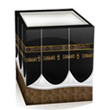Chapter 259: Condemnation of Double-faced People
- Details
- Category: Ryahd Salehine
- Published on Tuesday, 08 October 2013 11:35
- Hits: 823
Chapter 259
Condemnation of Double-faced People
Allah, the Exalted, says:
"They may hide (their crimes) from men, but they cannot hide (them) from Allah; for He is with them (by His Knowledge), when they plot by night in words that He does not approve. And Allah ever encompasses what they do.'' (4:108)
1540. Abu Hurairah (May Allah be pleased with him) said: The Messenger of Allah (PBUH) said, "People are like ores. Those who were excellent in the Days of Ignorance are excellent in Islam provided they acquire the knowledge and understanding of the religion. You will find the best people in it (Islam) those who had a deep hatred (for leadership). You will find the worst among the people a double-faced person who appears to some people with one face and to others with another face.''
[Al-Bukhari and Muslim].
Commentary:
1. "Like ores'' here signifies origin or source which will be a means of honour for them. That is, the tribes which were distinguished for nobility in the pre-Islamic period will also be distinguished after embracing Islam. There will be no reduction in their prestige and honour provided they attain true understanding of religion and adhere to its teachings.
2. Such people who do not have any desire for office and position are most suitable for holding the reins of government. They serve the interest of public better because, being aware to their responsibilities, they honestly endeavour to fulfill the trust reposed in them. They keep the boundaries marked by Allah and prefer the interests of the nation and their own country.
3. A "double-faced person'' is one who makes a group believe that he is their supporter and well-wisher, but when he goes to the opposite group, he tries to make them believe that he is entirely with them. The best among people is one who goes to every group and earnestly tries to reform it.
1541. Muhammad bin Zaid reported: Some people said to my grandfather, 'Abdullah bin 'Umar (May Allah be pleased with them):We visit our rulers and tell them things contrary to what we say when we leave them. `Abdullah bin `Umar (May Allah be pleased with them) replied: "In the days of the Messenger of Allah (PBUH), we counted this act as an act of hypocrisy.''
[Al-Bukhari].
Commentary: This Hadith points out that to praise the rulers in their presence and to condemn them in their absence amounts to practical hypocrisy because what one has in his heart does not find expression in his speech, and what one expresses in his words does not agree with what one has in his heart. The conduct of a true Muslim should be that if a ruler is noble, just and pious, he should admire him even in his presence (when there arises a need for it, and not for the sake of flattering him) and he should also praise him in his absence. If the ruler is bad, he should warn him of the evil consequences of his bad conduct to his face, and the same attitude should be maintained when he is not present because this is the well-meaning attitude which has been ordained to every Muslim. Against this, the attitude of the first kind is a mark of hypocrisy which has been strongly condemned in the preceding Hadith.





















